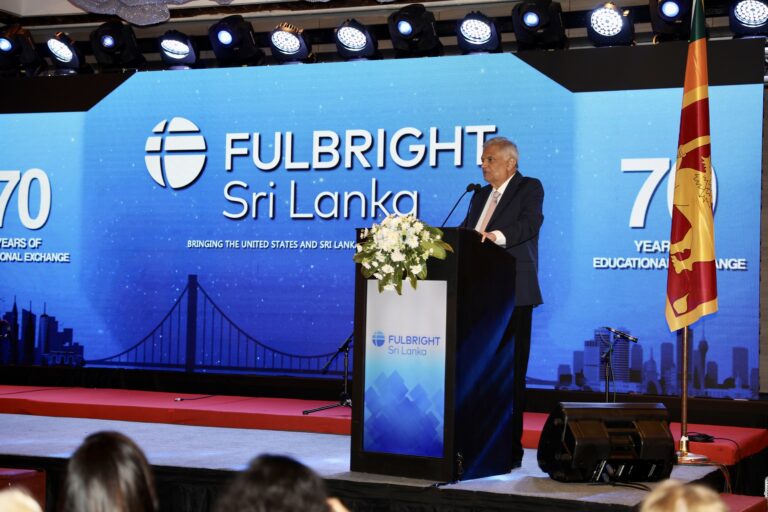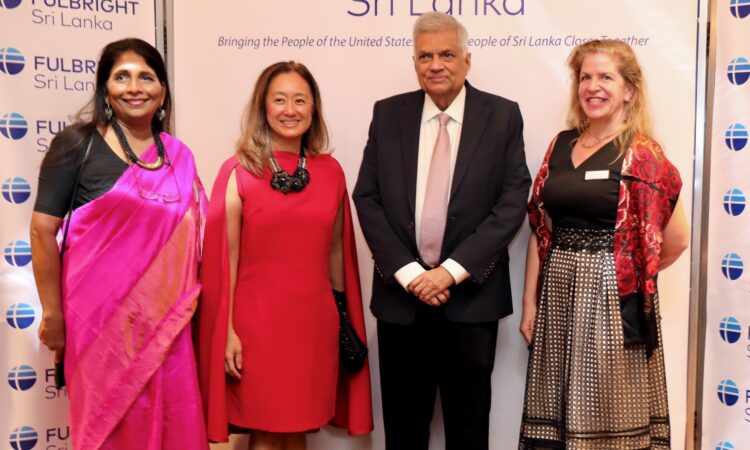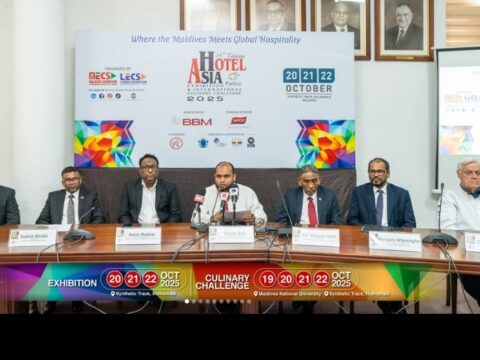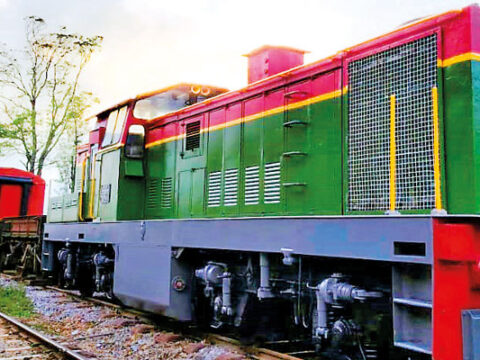COLOMBO: President Ranil Wickremesinghe, Minister of Education Susil Premajayantha, U.S. Ambassador to Sri Lanka Julie Chung, and the U.S.-Sri Lanka Fulbright Commission Board of Directors, Executive Director and staff celebrated the 70th anniversary of the launch of the binational Fulbright exchange program between Sri Lanka and the United States at a gala dinner on November 16 for current scholars, alumni, senior officials from academia and others who have supported the program for seven decades.
Since 1952, the U.S.-funded programs of the Commission have enabled over 2000 Sri Lankan and American students, scholars, teachers and professionals to study, earn graduate degrees, teach, undertake research and obtain professional development. As Ambassador Chung stated in her remarks at the gala evet: “Through the Fulbright Program, thousands of Sri Lankans and Americans have had the precious opportunity to study and live in our two countries, to share knowledge, to develop professional relationships and to develop lifelong friendships.”
At the ceremony President Wickremesinghe, Minister of Education Premajayantha, and Ambassador Chung hailed Sri Lankan and American current scholars and alumni of the program who typified the exchange of knowledge and professional development that has benefitted both nations.
The government is collaborating with the Californian university system to obtain assistance to modernize agriculture in Sri Lanka and to set up a new agro-technology university, said President Ranil Wickremesinghe.
He said that the government discussed with a group of Singaporean investors yesterday the supply of food for island nations and Middle East countries which lack their food resources. He said that this was only the start and he issued instructions to find the land for it and modernize agriculture. He said that Fulbright alumni such as Prof Pradeepa Bandaranaike are vital assets in modernizing agriculture. He added that the new agro-technology university will be combined with the Tea Research Institute (TRI), among others, to work with some of the American institutions on how to upgrade research in Sri Lanka.
 President Ranil Wickremesinghe also said that the government is focusing on improving English language education within the next ten years. He added that he hoped to obtain assistance for training teachers and trainers from the US counterparts for this ambitious project. The President assured the initiation of this project and said Sri Lanka will depend on the Fulbright scholarships and assistance to bring down counterparts from America.
President Ranil Wickremesinghe also said that the government is focusing on improving English language education within the next ten years. He added that he hoped to obtain assistance for training teachers and trainers from the US counterparts for this ambitious project. The President assured the initiation of this project and said Sri Lanka will depend on the Fulbright scholarships and assistance to bring down counterparts from America.
President Wickremesinghe said that the foundation for the friendly relations between the two countries is the educational exchange program, especially the binational Fulbright exchange program between Sri Lanka and the United States. “We have had about 3000 scholars from Sri Lanka and America who typified the exchange of knowledge and professional development that has benefitted both nations. And they have made a big impression on Sri Lanka. They have enriched our society and made our culture so much more vibrant.”
He said the two countries were celebrating 70 years of formal education exchanges in Sri Lanka. He added that the exchange goes back much further. The first exchange was when the American missionaries came to Jaffna and the imprint is still there. The second was when Colonel Henry Olcott came to Sri Lanka. That’s another imprint both in Sri Lanka and to a lesser extent in the USA. The next in the 20th century was when President Woodrow Wilson, declared the 14 points which also guaranteed independence to the colonial states.
The President further noted that it was followed during World War II by the four freedoms given by President Roosevelt. “So, Sri Lanka gained independence out of that war. Sri Lanka and the U.S. had strong links during World War II and became independent nations, on which the two countries have built those relations.
He further said that relations between the two countries are not only based on education and culture but also on economic assistance and political issues where both stood on the same side, science, technology and many other areas.
US Ambassador Julie Chung and Executive Director of the United States-Sri Lanka Fulbright Commission Sandarshi Gunawardena also spoke on the occasion. Other guests at the event included Parliamentarian Harsha de Silva, Secretary to the Prime Minister Anura Dissanayake, University Grants Commission Chairman Prof Sampath Amarathunga, Chancellor of the North-western University Prof. Udith Jayasinghe, Chancellor of the Jayawardenapura University Prof. Sudantha Liyanage and Chancellor of the Ruhuna University Prof Sujeewa Amarasena also participated.
In her remarks the US Ambassador cited the example of a young Sri Lankan biology student who earned a Master’s and a PhD in the United States and returned to direct a biosafety lab at a Sri Lankan university that will strengthen the country’s capacity to achieve food security. She also highlighted an American teaching assistant who is currently in Sri Lanka, teaching English to Sri Lankan undergraduates despite the ongoing economic crisis.
Fulbright’s Sri Lankan history includes many other examples of beneficial impacts: An American senior scholar attached to the Ministry of Health developed Sri Lanka’s first Master of Science program in health education and two Sri Lankan scholars returned to introduce courses in global politics and conflict resolution based on their Fulbright experiences. Globally, Fulbright alumnae have included 41 current and former heads of state and 62 Nobel Prize winners.


Ambassador Chung also saluted the binational Fulbright Commission and its staff based in Colombo: “The last 70 years of successful two-way cultural and academic exchange is no doubt due to the tremendous efforts of the U.S. –Sri Lanka Fulbright Commission, its board of directors and support from the Government of Sri Lanka.”
Launched in 1952, the initial Fulbright program in Sri Lanka sponsored short-term academic exchanges and was then expanded 12 years later to become a permanent agreement between the two countries.
Currently, the Fulbright program in Sri Lanka is fully funded by the U.S. government and enables gifted young scholars to pursue graduate degree programs with generous scholarship support; scholars and professionals to teach and conduct research; and teachers to get valuable training. It also encourages linkages between Sri Lankan and American universities and provides opportunities for Sri Lankan and American senior scholars to develop joint research relationships.
For more information about current Fulbright opportunities, please visit fulbrightsrilanka.com




